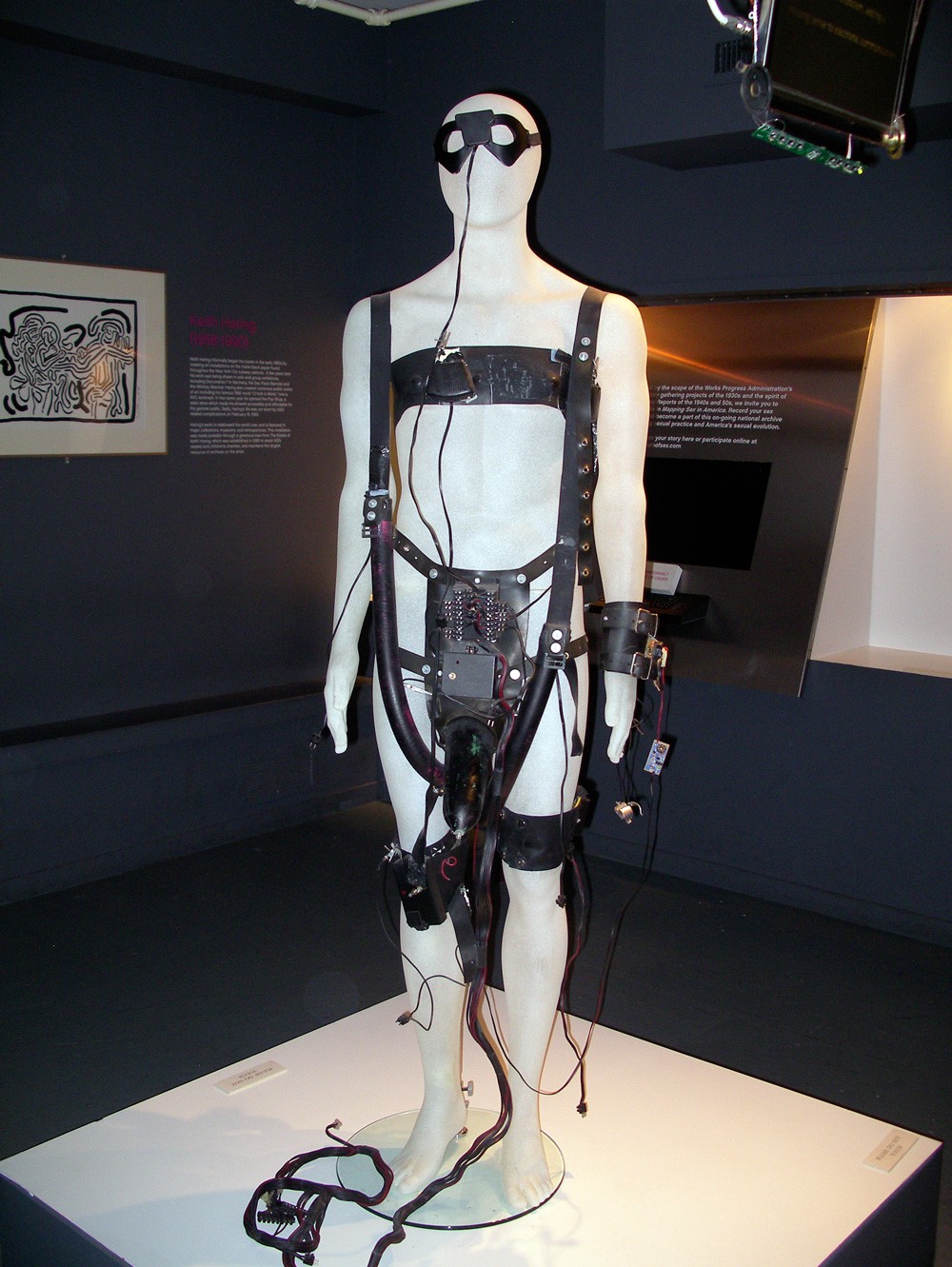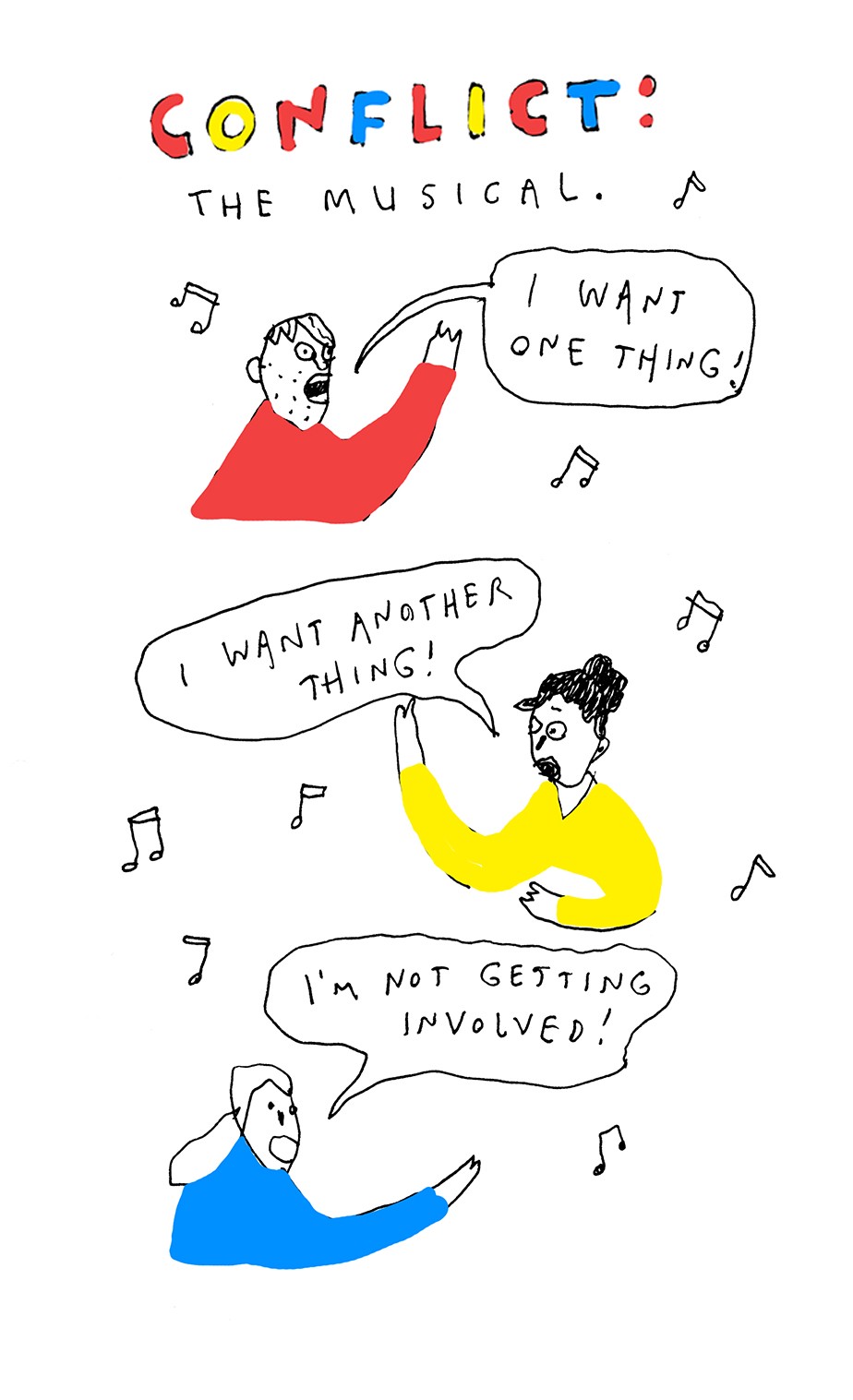Goldfrapp, "Systemagic"
There are only a few good things left.

If the last six months have sucked in every other possible way— and they have — the period in music has been an unexpected pleasure, particularly when it comes to acts first established in the ’90s. New albums from The Magnetic Fields, Gas and Lambchop have all been remarkable and sometimes surprising examples of continued vitality. Included in that category is Goldfrapp’s Silver Eye, the latest video from which is directed by Allison Goldfrapp herself. Enjoy, in case it’s the best thing that happens to you this week — which it very well might be.
New York City, April 23, 2017

★★★★★ The five-year-old pointed out the sparkling things in the pavement underfoot. The sky was clear and the breeze was clean, so straightforward it was hard to understand why so many days had gone by clotted and complicated with other conditions. The five-year-old had already been out earlier, pulling on his socks while his parents were still pajamaed or standing over a frying pan. Every individual in the Park was sharply drawn and richly colored. Softball teams were out on the fields, in full or partial uniform, mixed and matched around the same infield. Cameras were pointed at the tree cascading with pink blossoms at the edge of the Sheep Meadow. People not the least bit outfitted for sunbathing had laid themselves flat on the turf, long pants and all. The undulation of a cloud briefly matched the undulating line of the thickening treetops. A carriage horse turned its head and made eye contact out beyond the normal range of its blinders. The line outside the bakery was absurd but it was an excuse to stand out on the sidewalk. Some clouds diffused the sun for a while in the afternoon, a reminder of how far from easy it was. Possibly even a raindrop fell. But the light came back; people hollered watching sports on their building’s roof deck television. What remained of the clouds showed glimmers and hints of color and glory, then flared to pink, intensifying to a brilliant orange with an oculus of pale blue in it.
How* Forbes Became The Kushner Family Newsletter
*I don’t actually know that’s just the title formula Forbes uses.


Perhaps you watched John Oliver last night? He asked two very good questions about the couple no one but former Awl technician and Texan anthropologist Dusty Matthews has ever referred to as “Jarvanka”: 1) who really IS Jared Kushner, and 2) what does Jared Kushner even sound like?
Oliver meant like vocally what does his voice sound like, which is not as far off from Gilbert Gottfried as you might think (that clip is worth watching if you want to hear how Jared really feels about the mythical, barbaric lands of Breukelen where there are no razors or fresh water), BUT it is a great question more generally, as in, how does Jared come off when he gives quotes to the media? And the answer is nobody knows, because he never does it, especially not in a world where Donald Trump is his boss. Except there was that one time, last December, where Forbes put him on the cover and boldly proclaimed he clinched the election for Trump by “Moneyballing” the electoral college.
Kushner almost never speaks publicly — his chats with FORBES mark the first time he has talked about the Trump campaign or his role in it — but interviews with him and a dozen people around him and the Trump camp lead to an inescapable fact: The quiet, enigmatic young mogul delivered the presidency to the most fame-hungry, bombastic candidate in American history.
Exclusive Interview: How Jared Kushner Won Trump The White House
Henry Kissinger, Peter Thiel, and Eric Schmidt all gave pretty fawning quotes for this story. For his part, Peter Thiel said, “If Trump was the CEO, Jared was effectively the chief operating officer.” First of all, the CEO was Steve Bannon, which would make the COO, oh, I don’t know, gin? And second of all, we all know how Kissinger really feels (hint: he doesn’t) about Jared. Third, the only quote worth two grains of salt in this whole profile disproves the entire thesis of the cover story:
“I called some of my friends from Silicon Valley, some of the best digital marketers in the world, and asked how you scale this stuff,” Kushner says. “They gave me their subcontractors.”
Anyway the rest of it is boring and might as well not have quotes from Jared because it’s barely clear the author was even with him in person and there are no physical details about Jared the person, like, where have the dimple-producing face weight and pallor-covering tan gone? Indeed, why Forbes? Because Jared Kushner is a business, man, and Associate Editor Steven Bertoni’s beat at Forbes is basically “startup bros.” You know who else is a startup bro? Literally a startup of a younger brother, Josh Kushner, whom Bertoni breathlessly calls “one of Manhattan’s most connected people,” which seems like a personal affront to the president himself.
Bertoni has profiled babyface Josh not once but twice—first, when he was 26, the classic age at which venture capitalists are their most babyfaced and model-datingest and now at 31 after he invented Obamacare, I mean Oscar the health-insurance startup.
The 26-Year-Old VC Who Cashed In On Instagram
The latest baby Kush profile by Bertoni was accompanied by a cover photo of Josh in his signature sweater (which we are to take as a symbol of his chill and approachability) and the deadly coverline, The Other Brother.
Josh Kushner’s Complex World: How Jared’s Liberal Brother Runs A Billion Dollar Fund In Trump Era

Inevitably writing about the brothers Kush in the course of the same piece becomes confusing, because the author weaves in and out of calling both Josh and Jared by their shared last name only.
As we approach 100 days into the Trump administration, Kushner’s situation has arguably worsened.
To be fair I think it’s worsened for both of them! But here Bertoni means Josh. Arguably.
While Jared Kushner, at 36, has become one of the most influential people in the world, he was given every break that got him there. He was handed the keys to the family business by his father, Charles, who then went to prison for illegal campaign contributions, tax evasion and witness tampering. And he was handed the keys to a presidential campaign by his father-in-law, where he developed the data operation that ultimately delivered Trump the White House.
Jared was also given admission to Harvard by no one that definitely didn’t not have anything to do with Charles Kushner’s $2.5 million dollar donation in 1998 to the very poor school that definitely needed more money. But wait! The setup here is like a perfect alley-oop “caught” on Vine where the ball just happens to go out of the frame at the right time:
As heirs to billion-dollar fortunes go, Josh is the self-made man, abdicating a comfy seat at the family real estate firm to create something independent and new.
Did you get that? Josh Kushner is self made. He made himself all by himself without any of his friends from Manhattan or Harvard College or the Spee or Harvard Business School or New Jersey or Thrive Capital or Karlie Kloss or Charles Kushner or any of his smart friends he hired to work at Oscar:

Also, is it fair to say he abdicated the family throne, or is it fairer to say that perhaps it is not the most PR-friendly thing to follow in your father’s muddy footsteps? Plus, I mean look at that face. That face is so good at raising hundreds of millions of dollars that was actually confused by the Forbes art department as the Oscar logo:

All of this is to say essentially that it’s as though the Kushner brothers never really spoke to the press in the first place, and these are more like press releases. We all know that the people who strategically avoid the press are both smarter and dumber than the rest of us. They know there is nothing to be gained from speaking on the record, but they do not realize that we’re going to figure them out anyway. Damned if you only talk to Forbes and they write nice things about you. What would you ask Jared Kushner, if you had the chance?
The Dildo of Damocles
What happens when you connect sex toys to the internet?

About a year ago, Udo Schneider of the global software security firm Trend Micro plopped a big pink vibrator down in front of a group of journalists at a press conference in Hanover, Germany. With a few simple tips and taps on a nearby computer, those at the event later reported, he then turned it on — remotely and without the use of any app directly tied to the writing implement.
Schneider’s stunt was one of several presentations in recent years that have shown how easy it is to hack the growing field of digitally connected sex toys. Last summer, at the Def Con hacker conference, a talk on the vulnerability of the We-Vibe remote vibrator made it clear that some devices collect user data for analysis — in the case of that device, they did so at least partially without the legal consent of users. A month later, two women filed a lawsuit against We-Vibe’s maker. It was one of the first major cases on data integrity and privacy in sex toys, and the few information security experts who probe this odd niche suspect it will not be the last.
One might have assumed that sex toy developers, often self-avowedly sensitive to user discretion and privacy, would have adopted some of the highest security standards for their high-tech devices from the start. They have at least been responsive to outcry following recent revelations; they may even be incentivized (and able) to build some of the strongest privacy and anti-hacking norms in the world of smart devices. But it’s up to an alliance of hacker activists and consumers to push for those standards, as not every developer will recognize risks or take full responsibility for them on their own. Users need to know the risks inherent in those products, and how best to protect themselves.

The risks of sex-toy hacking are intuitively dire given how inherently private sexual information is. But even experts can have a hard time pinning down specific vulnerabilities — high-tech sex toys are diverse in function and thus in the information or access they might provide. Demos like those by Trend Micro or the Def Con hackers have focused on a few vibrators, but teledildonics — the industry term for a wide variety of remote sex technologies — currently encompasses dozens of devices. They range from basic vibrators a partner can activate from afar to the high-end Kiiroo’s Onyx and Pearl, a vibrator and masturbation sleeve combo that connect to allow one to experience a distant partner’s actions in real-time. Theoretically, the toys of the future could even allow users to record every physical aspect of a sexual encounter, remote or proximate, and save it for replay or distribution.

As with any smart device, there’s the obvious risk that a company could opaquely collect and sell, or a hacker could illicitly siphon off, metadata on users. Think: the sort of stuff ostensibly gathered for market research, like when devices are being used and how. Last spring, a hacker known as Render Man launched The Internet of Dongs (a play on the industry term for smart device networks, the Internet of Things) to probe and detect security risks in sex toys. He explained how, in the wrong hands, innocuous data could reveal uncomfortable details. “Data about when a device is used,” for example, he said, “may be evidence of infidelity, as is who a user is connected or ‘paired’ with.”
Ken Munro of Pen Test Partners, a British security firm that’s dabbled in protective dildo hacking (yes), said he’s “much more concerned about the audio and video that is linked to these toys.” On April 3, the firm reported on a dildo with a WiFi-connected endoscopic camera that testers characterized as trivial to hack. “Sextortion is a growing problem around holding individuals to ransom over very personal videos,” he said, citing a spate of scams in recent years in which women target lonely men on Skype and get them to masturbate or talk dirty, record the session, and then demand payoffs to hold the content.
But the risk of extortion may be the least of it. Kyle “qDot” Machulis of the teledildonics blog Metafetish is much more concerned about the possible direct physical consequences of toy hacking. First, there’s what Render called “incredible stalking potential.” He and Future of Sex editor Jenna Owsianik both noted that the right security flaws may allow hackers to gather identifying details, like an email address, as well as geolocation data and an IP address. Then there’s the issue of long-distance sexual assault. Owsianik and Render believe there’s a real risk an outside party could activate individuals’ sex toys. If a toy goes off in a sock drawer, that’s one thing; if a hacker takes control of one in use, that’s completely another.
This type of cyber assault is especially concerning given how difficult it could be to prosecute. Provided a victim could even find someone to sue, Alice Vachss — an outspoken sex crimes prosecutor and public commentator — said you could certainly charge them with the unauthorized remote control of a device, which is a crime. However, she added, “sex toys have long been a prompt for victim judging,” meaning it could be difficult to get anyone to take the cases seriously enough to pursue them with force. And in many jurisdictions sex crimes cases, as opposed to lesser harassment charges, require proof of intent, which could be hard to prove with a hacker. Did they know a device was in use? Did they intend, by hacking, to derive sexual stimulation from or to assault the user?

It’s surprising a collective uproar over security issues didn’t come sooner. The concept of teledildonics has been around since 1975, the tech involved could have been realized in early and low-fi forms in the 1980s, and basic cyber-linked sex toys came onto the market in the 1990s. The wider sex toy industry started serious forays into teledildonics over a decade ago. Machulis started covering teledildonics in 2004, and security has been on his radar that entire time; Render started to explore the field a year later.
The wider public has had several years to adjust to the now-popular knowledge that any digitally connected device, like the Cinder grills, Nest thermostats, all-powerful Amazon Echoes, or any other number of products that have started to proliferate in many homes over the decade, can be hacked. Tech outlets were warning of systemic risks throughout smart device networks almost four years ago, and three years ago mainstream outlets started ringing alarm bells about industry reports that nearly three-fourths of all such devices were particularly vulnerable.

Consumers might be aware of general hacking risks, said Machulis, but they rarely remember to think about the sock drawer. Machulis thinks that’s because we’re so used to certain ways of thinking about sex toys — they’re walled off, clandestine, low-tech. The folks he talks to often know about phone sex or sexting, but they think about teledildonics like sex robots: something far off rather than an immediate reality. Even when users do become aware of threats to security through their digital devices, they can be bad about taking precautions. “There are a lot of people who know the problems and are like, ‘fuck it, I want to use it anyway,’” said Machulis.
According to Render, toy developers were until recently entirely hardware vendors, not used to dealing with software. On top of inexperience, the necessity of getting a product to market quickly while keeping development costs low disincentivizes agonizing over security. “They are genuinely and innocently ignorant of the threats they face until it bites them,” Render said.
For a long time, Render claimed, no one in the tech industry would take it upon themselves to investigate and tip producers off to security shortcomings because of the subject matter. “I have no dignity, so I have no problem with it,” he said. “I see a problem and I feel this compulsion to fix the risk.” So he got proactive about testing devices and alerting manufacturers to flaws a little less than a year ago. (For all his claims to dispassionate and analytic motives, Render will admit that it feels odd to “device job satisfaction from helping people masturbate each other safely… making my mother proud.”) But his one-man crusade was long a limited and low-profile venture. He believes that until last September’s We-Vibe lawsuit, most toy developers still had no idea of the risks they ran.
Although sex toys were a tiny and low-rent market for much of their considerable history, they started to gain in social acceptability in the late 1990s (props to “Sex and the City”). Now it’s an over-$15 billion industry, projected to hit $50 billion by 2020, with hundreds of thousands of toys available across the web and even in big-box stores. It’s hard to tell how much of that market is devoted to teledildonics, or how many connected sex toy users there are overall, but We-Vibe alone had two million registered users last fall. The economically ailing adult industry also feels intense pressure to move into and mainstream virtual reality porn and remote sex rigs as fast as possible to restore its profits. Innovators spurred on by the growing market for these devices are developing ever more immersive and thus invasive and risky products.
In recognition of the expanding number of smart toy users potentially at risk, the hackers behind the Def Con We-Vibe presentation launched the Private Play Accord, an initiative to create toy security protocols . Render claimed their hack validated his own probing around and gave him the shot in the arm to really get working on the Internet of Dongs. Since then, Pornhub — arguably the king of modern porn delivery and itself a potential teledildonics player — has signed on as a sponsor. They help Render acquire toys to test and back him as he approaches developers with notes and advice. His idea is for the project to turn into — in true hacker-culture form — a loose alliance of researchers, united in intent and concern, all collaborating to make modern masturbation safer.

The makers of We-Vibe didn’t respond to the Def Con presentation last summer, and responded to the lawsuit with pretty perfunctory statements. Even when they settled the suit for $3 million and agreed to destroy the data they’d collected this March, they admitted no wrongdoing. Munro said making people aware of risks often just leads developers to offload responsibility onto consumers in user agreements and notifications. But Render has been pleasantly surprised by the way the industry as a whole has reacted to his recent work. “Every single person I’ve talked to… has been supportive of [his white-hat hacking] and quickly realizes they need to get their act together,” he said, adding as an afterthought that, at the very least, no one’s sued him yet.
Machulis said he thinks this responsiveness is, at least in part, a manifestation of economic realities: The sex toy market is expanding, but it isn’t quite like big appliance or electronics firms yet. Most tiny, relatively young developers can’t take a huge monetary hit on a scandalous public lawsuit, or suffer terrible PR incidents. Machulis’s dream is that this vulnerability will push producers to hold all their future products to higher security standards. That would realize Render’s dream of security proactive enough that sextortion, stalking, and cyber-assisted rapes are always things we worry about in abstract, but never see in the headlines.
Not everyone in the adult industry takes hacking risks seriously yet. Ariana Rodriguez, who covers devices and innovations for the industry publication xBiz, said she believes “concerns about hacking sex toys are baseless,” because she is convinced the adult industry is built on privacy. But this reaction doesn’t recognize that a commitment to privacy doesn’t always mean you know how to achieve it — and that’s the problem.

In the We-Vibe lawsuit — the biggest public alert regarding toy security to date — Render believes there was no evidence of anything shady. The company essentially got slammed for not disclosing correctly what data it was collecting, but did not appear to be selling or compromising what limited data it did collect. The threat that case highlighted remained abstract to users, which is a problem as efforts like the Internet of Dongs will likely need popular support — i.e. clear indications that consumers will punish developers who fail to adequately address security issues with a firm blow to their bottom line — in order to push past the industry’s worst recalcitrance and ignorance. Hackers’ tips for consumers on how to secure their devices won’t go very far unless users are motivated to listen to or consult them.
Ultimately, security experts believe a high-profile security violation is imminent. Render says he’s waiting for the first divorce case tied to leaked device data or a major extortion scandal within a year or two, and suspects there could be a hacked toy assault case in the news within five years. Machulis “figured [a rape] would have already happened by now, honestly.” How severe the hack is and whether it will galvanize the industry or torpedo consumer confidence in the whole endeavor is entirely up in the air. It’s a strange Dildo of Damocles to have hanging over our heads, as an increasingly sexually explorative and comfortable culture. But at least the level of risk we expose ourselves to in a world of teledildonics is in our own hands.
Stay In The Friendzone
Because marriage is a shadow dimension
“Jim, I’m stuck in the Friendzone. What should I do?” — Friendzoned Freddy

Freddy, if I’ve told you once I’ve told you a million times: love is bullshit and an illusion. The need for companionship, help raising kids, assistance paying rent and occasional sexy action: those are real. This does not require someone that makes your heart go pitter-pat. If you’re stuck in an elevator with someone you’re attracted to for 12 hours, you will probably fall in love with them. That’s not finding a soul mate. That’s just proximity and opportunity and elevators being crappy.
If I had to do it all again, I would go back in time and give back my worthless English degree. Instead I’d get an Escalator/Elevator repair license. Elevators and escalators are always broken. And it’s more difficult to get stuck on an escalator for 12 hours. Unless you’re ground up inside its guts.
It is nice to have crushes on people. Especially people you can never be with. You can write cute, lovelorn poems about them. You can build them up in your mind until they are absolute perfection. Yearning for something we can never have is kind of invigorating. I do this all the time. It is my preferred relationship. I get to feel all warm and floaty. And I never have to be in a real, adult relationship with someone I will eventually disappoint either as a lover or as a partner. I always forget to take out the garbage. I also don’t make any money. I also don’t watch anything other than Sports and I play Ween constantly on repeat as loudly as possible. If I weren’t attached to me I wouldn’t want to live with me, either. Living with people is kind of brutal and harrowing and you always have to pretend to listen to what they’re saying. That’s worse than being alone for the rest of your life.
At least when you’re in the friendzone with someone, you have a friend. Someone you like hanging out with, who likes the same dumb things you do and who makes you feel good to be around them. This is different than any other long-term relationship you can be in. After the first few years, it’s all eye rolls and that masturbation hand-signal whenever you’re not looking. Even the couples that start off the cutest end up acting like they’re in the third act of Who’s Afraid of Virginia Woolf? after a while. Because monogamy is nonsense and inevitably you end up blaming others for your own poor choices. Which is fine: you are attached to yourself. At the very least be on your own side.
Enjoy your time in the Friendzone, Freddy. You’re going to need friends if you ever do get into a serious relationship. Because people in serious relationships all vent about how crappy their relationships are. Then they go home and do nothing to solve the deep-seated problems of their relationships. Because bitching about them is easier. And being alone is so terrible. Also you’ll need friends to help you move out of your shared apartment when your serious relationship goes belly up. Friends that will help you move are the best kind of friends. Right up there with the friends that will have fun, meaningless sex with you for no particular reason.
The best way of getting out of the friendzone is just finding someone else. When you’re in the friendzone, you are like someone’s emergency back-up lover. If something should happen to the person they’re purusing, you might be up next. If you are no longer in a twilight stage of constantly doting and available, they may freak. I was once in the friendzone. I made up a new girlfriend. I called this girlfriend “The Furry.” The lady who friendzoned me saw right through my ruse and married some other dude and is now completely gone from my life. I don’t think she was the least bit interested in my furry scenario.
Happiness is mostly unattainable. If you weren’t almost constantly searching desperately for a better way to live and be, you’d be like a dog who caught the car it was chasing. Now what are you going to do? Who the hell knows? If you became the perfect version of yourself, solved all your problems and became truly satisfied you’d probably be as bored as hell. You’d have an affair just to keep things interesting.
Refuse, Freddy. Simply refuse to play along with the sick games the universe throws at you. The universe is a cruel enough place without you playing directly into the hands of the great puppet masters. Accept your fate in the friendzone. Marry someone you like less then you imagine you like this unattainable person. And live your life as a somewhat-satisfied still-always-searching desperado.
Everyone dies and only a very few people will actually care about our deaths. You know who will care the most? You will, Freddy. You will care a lot about your own death. I don’t think dying in someone else’s arms is going to make a hell of a lot of difference in the outcome. You will probably only be passingly aware that you’re dying in someone else’s arms before you are totally dead. Then you will care a lot less about having been alone when you were dying. You’ll be dead. You will care not at all. Like New Year’s Eve. A kiss the next morning means nothing.
Jim Behrle lives in Jersey City, NJ and works at a bookstore.
President Unintelligible
Um, help?

TRUMP: Number One, there’s great responsibility. When it came time to, as an example, send out the 59 missiles, the Tomahawks in Syria. I’m saying to myself, “You know, this is more than just like, 79 (sic) missiles. This is death that’s involved,” because people could have been killed. This is risk that’s involved, because if the missile goes off and goes in a city or goes in a civilian area — you know, the boats were hundreds of miles away — and if this missile goes off and lands in the middle of a town or a hamlet …. every decision is much harder than you’d normally make. (unintelligible) … This is involving death and life and so many things. … So it’s far more responsibility. (unintelligible) ….The financial cost of everything is so massive, every agency. This is thousands of times bigger, the United States, than the biggest company in the world. The second-largest company in the world is the Defense Department. The third-largest company in the world is Social Security. The fourth-largest — you know, you go down the list.
AP: Right.
TRUMP. It’s massive. And every agency is, like, bigger than any company. So you know, I really just see the bigness of it all, but also the responsibility. And the human responsibility. You know, the human life that’s involved in some of the decisions.
Does anyone know what this interview says?
Project Pablo, "Risk the Rip"
Why is it Monday again?

I don’t like it any more than you do. None of us likes it. And yet, here we are. I would tell you that things will get better but I’d like to think by now you know I’d never lie to you. Things at best will stay the way they are, and we all know what that’s like. Anyway, here’s some music. Enjoy? [Via]
New York City, April 20, 2017

★★ Fairly even clouds filled the sky, and fairly even water filmed the pavement of the schoolyard. What rain was falling could be ignored for minutes on end, if not all the minutes of the wait for school to begin. The bulk-planted daffodils had shriveled where they stood. When it seemed that the clouds had secured the day, the sun suddenly faded in, and for a while the sky even had blue in it. The gray returned though, and with it came a stifling and pervasive dampness, heavier by the hour.
> EleanorBot
From Everything Changes, the Awl’s newsletter. Subscribe here.

I’ve been on kind of an Eleanor Roosevelt reading binge lately. She led a privileged life, to be sure, but not an easy one. Here is a lady who went through some shit: She was ignored and unloved by her beautiful mother because she was ugly. She lost her mother, a brother, and her beloved, alcoholic father before she was 10 years old. She was left to help bring up her surviving younger brother. She bore six children herself, one of whom died as an infant. Her husband developed polio. He cheated on her with his secretaries. Throughout all of this she was maybe gay.
Despite of/because of all this she served in the White House for 12 years. She helped lead her country through an economic depression and a world war. She championed civil rights, the United Nations, refugees, and women’s right to work.
I like her a lot so I made a bot for you of smart things she said. It’s called @_EleanorBot_.

If you want realtalk from an immanently practical dead first lady who lived through times as crazy as ours, feel free to follow. And I hope you have a good weekend.
From Everything Changes, the Awl’s newsletter. Subscribe here.

